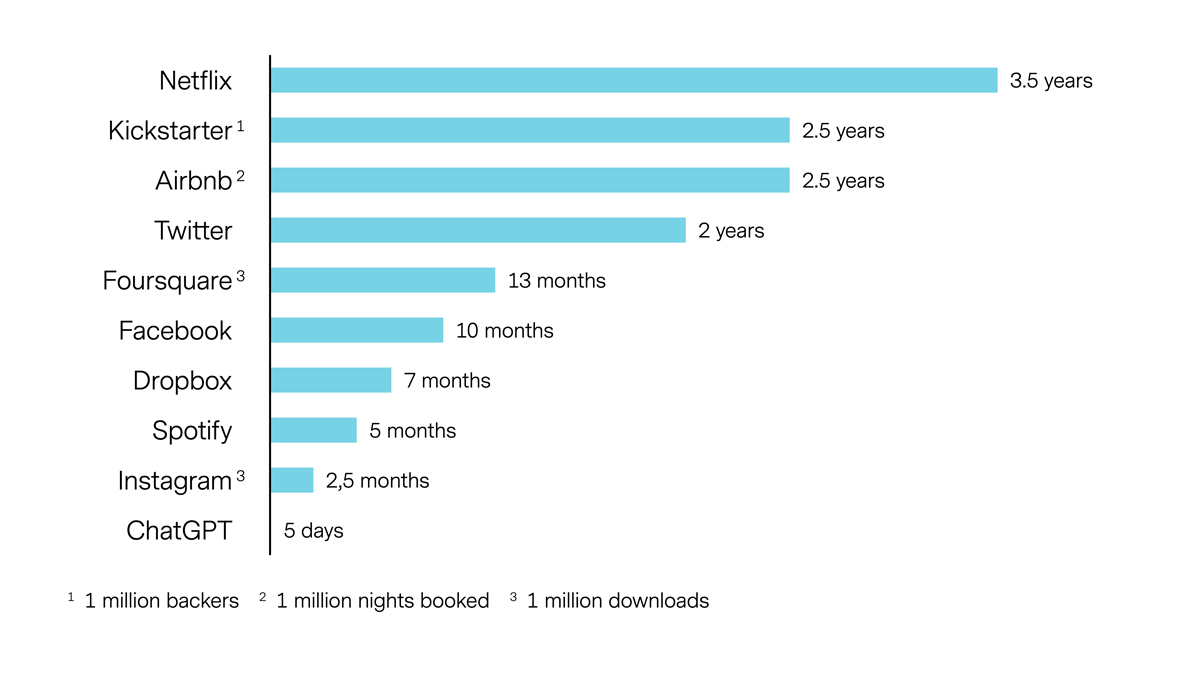Artificial intelligence opportunities
The AI revolution has just begun. Join in on this development in all its variety and complexity—both in individual industries and along the entire value chain.

Artificial Intelligence: The Investment Case for the Hype

It's topic number one, not only to the tech-space: artificial intelligence (AI). So-called "chatbots" like ChatGPT have reached record high usage rates in recent months. Even if its popularity is considered hype by some, one thing is certain: The potential of AI for industry and business is enormous. For investors, it’s a good time to look beyond the headlines and find out what opportunities the world of AI holds.
In the last weeks and months, executives from diverse industries praised the potential of AI in their latest earnings presentations and committed to strong investments. A powerful group of experts—including Elon Musk (founder of Tesla), Steve Wozniak (founder of Apple), and industry-leading engineers from Amazon, Google, Meta, and Microsoft—even signed a letter calling for a six-month pause in AI development. But what is AI exactly?

Source: Vontobel 2023, prepared in-house based on data from Business Insider and LinkedIn, aggregated by Statista.
In short, AI is the replication of human intelligence by machines or computers. Its algorithms can rely on statistical models and neural networks to perform tasks such as decision making and problem solving. AI is particularly powerful in processing large sets of data.
More recently, AI technology got used in internet search engines to make search results more effective (Google). Also, it has supported the commercial success of many platforms (Amazon) and networks (Facebook) by making advertising ever more targeted. Speech and facial recognition can improve customer experience but also play a role with IT security (Apple). And next-generation language translation tools (Deepl) have made the life of employees in the corporate world more efficient.
With the launch of ChatGPT, the field of “Generative AI” has been identified as the next breakthrough field of AI by many. Until recently, machine learning was largely limited to predictive models and the observation of patterns. What makes Generative AI different is its ability to independently create a wide range of both new and unique content by learning patterns from existing data. Such content includes images, videos, audio, text, and 3D-models.
In the same context, Generative AI is able to break down communication barriers between humans and machines. In the example of ChatGPT, a so-called chatbot, this means gathering information through typed conversations. Also, ChatGPT can write essays in a variety of styles, write computer codes, explain complex concepts, summarize texts, and answer anecdotal questions—all things that previous versions of AI were not able to do. And on top of that, ChatGPT is constantly evolving. According to OpenAI, the developer of the chatbot, the latest version GPT-4 leverages even more data and more computation to create responses. This begs the question of how companies can benefit from AI.
While the press coverage is currently focusing on ChatGPT, there are—and seem to be more and more—applications of AI in other than just the technology sector. In healthcare, for example, AI could be used for patient diagnosis, personalized treatment plans or in the design and testing of new drugs. Also, chatbot-style telemedicine services could improve access to healthcare advice. And it could help to improve administrative efficiency through the faster processing of medical records.
In manufacturing, automatization through robotics will likely see much progress. In the car and transportation industry, the combination of computer vision, image recognition and Generative AI is a precondition for autonomous driving. In education, teachers may gain more time for tutoring when AI takes over the task of exam assessment. And in business, CRM-tools will get more targeted.
However, the increasing spread of AI also involves a geopolitical dimension.
The case for onshore and nearshore production—we call it the trend toward slowbalization—has gained momentum for many companies in recent years. Geopolitical tensions between the West and China have increased, and the need to address climate and environmental issues is more pressing than ever. Add to this Covid and the war in Ukraine. The overlap of these two crises has only recently highlighted the drawbacks of long, international supply chains.
What has so far stood against accentuated onshoring in a stable political environment has been the cost. Although wages are rising in Asia, and especially in China, the overall cost is still lower than producing in the West. So, relocation has not been worth it so far. This is where AI could turn things around. As the cost of implementing and maintaining AI technologies in automation becomes lower, companies may be willing to take on the cost of relocation.
We have identified three groups of companies that enable the use of AI or are likely to benefit from its use.
Group one is “core enablers”—those that are necessary for the spread of AI or offer services in this area. Among them are chip and semiconductor manufacturers such as Nvidia or telecommunications equipment suppliers. As one of the owners of OpenAI and ChatGPT, Microsoft is one of them.
Group two is the so-called “disruptors”. They use AI to disrupt traditional business models. One example is Amazon, which uses AI to provide targeted, individualized advertising and is “disrupting” conventional retail with its online platform.
A third group of companies, “Core Business Leveraging AI”, likely to benefit from proliferation is using AI to develop its core products or business, such as Meta, the parent company of Facebook, or the drug manufacturer Moderna, in the development of medicines.
Both companies and investors seem to have identified the potential of AI in the world of business. As a result, the flow of capital into the technology and its companies has increased significantly over the course of the last years. According to IDC, a market research and consulting company, global spending on AI is forecast to reach USD 154 billion this year—up from USD 24bn in 2018. By 2030, this will create a global economic value of USD 13 trillion, according to a Deloitte report in 2021. Also in 2021, Accenture, another consulting company, expected this number to be at USD 16 trillion—and increasing productivity by 26% and reducing production cost by 40%.
As all factors indicate, the current trend is based on robust dynamics. This provides investors with a wide range of opportunities.
Vontobel offers exciting opportunities to participate in the development of artificial intelligence, be it in individual sectors or along the entire value chain. Contact our experts to learn more about investment opportunities in this area.
Are you looking for access to our investment experts?We look forward to answering your questions.
|
 |